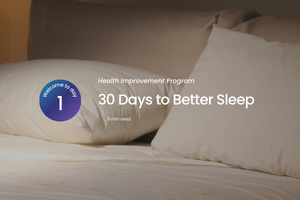
Morning sunlight supports your natural sleep-wake cycle.
Consistent sleep and wake times strengthen your rhythm.
Align your schedule with your natural tendencies for better sleep.
A consistent sleep-wake schedule is essential for optimizing sleep quality and aligning your daily activities with your body’s natural circadian rhythm. This routine helps improve energy, productivity, and your ability to both fall asleep and stay asleep. By sticking to a regular schedule, you’ll support your internal clock and enjoy more restorative sleep.
If you struggle with falling asleep and staying asleep, we previously recommended the strategy of sleep compression. This involves reducing time in bed to closer to how much you are actually sleeping. Once you reach about 90% sleep efficiency (or time in bed spent asleep), you can start increasing your bedtime window by 15 minutes until you are getting the sleep you need.

Morning sunlight supports your natural sleep-wake cycle.
Consistent sleep and wake times strengthen your rhythm.
Align your schedule with your natural tendencies for better sleep.
A consistent sleep-wake schedule is essential for optimizing sleep quality and aligning your daily activities with your body’s natural circadian rhythm. This routine helps improve energy, productivity, and your ability to both fall asleep and stay asleep. By sticking to a regular schedule, you’ll support your internal clock and enjoy more restorative sleep.
If you struggle with falling asleep and staying asleep, we previously recommended the strategy of sleep compression. This involves reducing time in bed to closer to how much you are actually sleeping. Once you reach about 90% sleep efficiency (or time in bed spent asleep), you can start increasing your bedtime window by 15 minutes until you are getting the sleep you need.

To create an ideal schedule, use your circadian rhythm insights, sleep log data, and a sleep calculator tool. A sample schedule might look like this:
7:00 AM: Wake up
7:30 AM: Breakfast outside, get ready
8:30 AM - 12:00 PM: Deep work
12:00 - 1:00 PM: Lunch
1:00 - 3:00 PM: Simple tasks (no caffeine)
3:00 - 5:00 PM: Deep work, end of work routine
6:00 - 7:00 PM: Dinner
7:00 - 9:00 PM: Wind down, dim lights
9:00 - 10:00 PM: Get ready for bed, relax
10:00 PM: Asleep
Sticking to a consistent schedule is crucial, as irregular sleep patterns can disrupt your circadian rhythm and affect sleep quality. But also, be sure to not overly fixate on going to bed at the same time every night. Periodically having an off night with your bed timing will usually not wreck havoc on your sleep. That being said, if you go to bed late on weekends and early on the weekdays, it may be harder to fall asleep on Sunday or Monday. If you need to adjust your schedule, plan ahead—such as gradually shifting your bedtime before daylight savings changes or special events.
Hint: if you are someone that relishes late nights with friends, try sticking to Fridays as your light night instead of Saturday so your body has more time to adjust to the time shift.

Action item
Create and record your ideal sleep-wake schedule, ensuring consistency for optimal sleep and well-being.
THE DOCTORS BRAND™
America’s leading clinically proven nutraceutical brand for better sleep, less anxiety and less pain
*These statements have not been evaluated by the U.S. Food and Drug Administration. Our product is not intended to cure or treat any disease.
MDbiowellness
Contact us
(805) 977-5709
M-F 9am-5pm PT
hello@MDbiowellness.com
© 2023 MDbiowellness